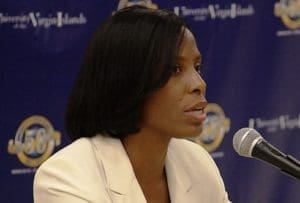
As Americans begin many of the pastimes of summer that are quintessentially American – baseball, backyard barbeques, family road trips – Caribbean Americans spend the month of June reflecting on their contributions and melded cultures in the United States.
Ironically, this June, Congress may vote on an immigration bill that will end the Diversity Visa Lottery program which has allowed many Caribbean people to come and be a part of the American experience. In a month of polarized politics and the Trump administration’s assault on increasing diversity in this nation, Caribbean American Heritage month serves as perfect counterpoint example to support the doctrine of Americanism.
Congress adopted H. Con. Resolution 71, which established the Caribbean American Heritage month, sponsored by Rep. Barbara Lee (D-Calif.) and signed into law by President George W. Bush in 2006.
“Whereas people of Caribbean heritage are found in every State of the Union …” is the first line of the U.S. House of Representatives’ resolution to establish a Caribbean American Heritage month. While the Act establishing Caribbean American Heritage month emphasized the present influence of Caribbean Americans, American history would not be complete without the integration and support of Caribbean people. From Americas founding to the present, Caribbean people have supported and assisted in the creation of a collective American identify – the articulation of the nation’s rightful place in the world, its traditions, its language and cultural style.
Despite being ostracized and alienated by many of his contemporaries for his Caribbean roots – but for Alexander Hamilton’s contribution to our military, creation of our banking system and assistance in drafting the Constitution – our country would not be as strong today as it is. From American Revolution Haitian gens de couleur libre (free men of color) fighting troops, slave revolt leader Denmark Vessey to Colin Powell’s shock and awe doctrine, the Caribbean emphasis on revolutionary and righteous principles enforced through martial action have supported American ideals both home and abroad.
Caribbean Americans have offered novel intellectual ideals to the lexicon of this country. Pan-Africanism and philosophy within the Harlem Renaissance were greatly influenced by such Caribbean minds as Claude McKay, Hubert Harrison, Arthur Schomburg, Edward Wilmot Blyden and of course Marcus Garvey. This idealism manifested itself later in the civil rights movement with more generally known Caribbean Americans such as Malcolm X, Harry Belafonte and Shirley Chisolm.
I recently spoke on a government panel along with my colleague, Dominican Republic native Rep. Adriano Espaillat (N.Y.) on “Growing up Caribbean in America.” Having parents that stressed the importance of Caribbean roots through stories of valiant men and women in “Afro-Caribbean” (indeed culturally African dominate) societies allows one to anticipate tremendous things for yourself. Many other Caribbean Americans have similar stories and share the same sentiments as I regarding the value placed on remaining as Caribbean as possible while completely embracing our American citizenship.
In today’s culture, many are surprised by the placement of Americans of Caribbean descent. They include former Attorney General Eric Holder to iconic personalities such as Lenny Kravitz and Beyonce; economic minds such as Federal Reserve Bank of Atlanta President Rafael Bostic to actors Kerry Washington and Jada Pinkett Smith; athletes like Tim Duncan, Mariano Rivera and Carmelo Anthony to journalist Joy Reid and U.S. Sen. Kamala Harris (D-Calif.). These individuals, as scions of the Caribbean region, are entirely American yet in many ways their Caribbean heritage informs and account for attributes which have assisted them in their advancement.
That philosophy is borne out with recent immigrants and naturalized Caribbean people. According to the Migration Policy Institute, “Latin American and the Caribbean accounted for the largest percent of foreign-born (military personnel) and that group constituted 38.7 percent of all foreign born that are in the armed forces. Additionally, according to the 2014 U.S. Census Bureau report, about 66 percent of Caribbean immigrants and immigrant overall (ages 16 and up) were in the civilian labor force, compared to 62 percent of the native-born. According to the Migration Policy Institute, Caribbean blacks had labor force participation rates that exceeded the averages for U.S. natives and all immigrants combined. The study from this institute also showed that collectively Caribbean blacks have higher median earnings than all immigrants in the U.S.
The Caribbean is a melting pot of different races, cultures ethnicities and languages; it is the southern reflection of the American experience. Caribbean Americans like all who come to this country desire to make themselves and this country better.
From the founding father to giving this country what I believe it’s most magnificent music in hop-hip created on the streets of the Bronx with young Caribbean American youth, through service, through ideals, and through protest even; immigrants have made this a great nation.
President Trump issued a proclamation on May 31, 2018, which stated that the Caribbean American Heritage month is a time in which America will honor “America’s long-shared history with our neighbors in the Caribbean and celebrate the Caribbean Americans who have enriched our Nation.” In fact, it is not a “shared” history; our neighbor’s history IS in fact our American history.
This essay originally appeared in The Hill.





